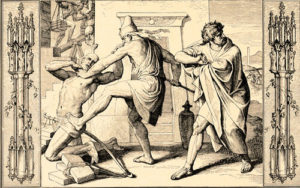OUR CALL IS IN THE GAP… THE THINGS IN OUR LIFE THAT WE DON’T WANT TO TALK ABOUT
April 14, 2021 2024-05-10 13:07OUR CALL IS IN THE GAP… THE THINGS IN OUR LIFE THAT WE DON’T WANT TO TALK ABOUT

OUR CALL IS IN THE GAP… THE THINGS IN OUR LIFE THAT WE DON’T WANT TO TALK ABOUT
The following was transcribed from “Your Call and Your Spiritual Autobiography” podcast, published September 18, 2018
Dr. Booth:
The book of Exodus begins by telling us that the original Israelites in Egypt eventually died and then we get to a new generation. This new generation experiences a boom in population . The story turns to Pharaoh. What is Pharaoh going to about all these Israelites? Pharoah’s idea, in be beginning, is slavery. He thinks that will solve the population problem, but it doesn’t work. He then decides to up the slavery, but that doesn’t work. Pharoah’s next idea was to ask the midwives to kill the Israelite male babies, but that doesn’t work because they won’t do it. Chapter 1 ends by saying that pharaoh asks all of the Egyptian’s to, every time I see a male baby, just toss them straight in the Nile.
Chapter 2 begins with an angle shift. It talks about a Levite who marries a woman and they have a baby. We’re now being introduced to the hero. We all know this part of the story. The baby is put in a basket and the princess sees this adorable baby that she can’t possibly kill. He gets adopted and taken inside the royal family, which, in an of itself, is a super cool point that I won’t get distracted on right now. He’s adopted and raised with royalty and education. The story goes into three quick stories about Moses to introduce you to who Moses is. In the first one, he walks out and he sees an Egyptian beating up a Hebrew slave and he kills that Egyptian. You initially think that this guy did this because he is still loyal to his own people. Also you’re thinking, “he just killed someone!” It’s not like he just had a casual conversation with someone. The next story is about two Hebrews who are fighting with each other (So now our initial assumption about Moses is wrong. We can’t think that his thing is just about him sticking up for his own people). He goes up to the one who was in the wrong and says, ‘knock it off’. So we ask ourselves, ‘what is this guy’s thing?’ Then he runs away because he realizes he could get in trouble for murder. He runs to Midian. Here is our third story. Some women were trying to water their flocks when some shepherds came and were jerks to the ladies. Moses came up and beat the fool out of those guys . So now we get a picture of who this guy is after hearing these three stories. Moses is a guy who is triggered essentially by injustice. He doesn’t like seeing the vulnerable picked on. It bothers him a lot. This is the character you’re being introduced to. If the whole thing was a movie, the only thing you would know about this guy is in the stories the author gives you. The author takes great pains to show you that Moses can’t stand this kind of oppression on the vulnerable. Then the story tells you that God heard the cry of the Israelites. He saw their plain and suffering (because now everything’s going to change). That’s the end of Chapter 2.

When we get to chapter 3, God calls to Moses, ‘I’ve heard what these people are going through, what’s going on with these people. I’ve heard them and it’s time. I’m gonna go in with a mighty hand and save them.’ Moses is thinking, ‘this is awesome!’, because this is his thing! This is what he is wired to care about!
But then God says, ‘and I’m going to send you to do it. I’m sending you to talk to Pharaoh.’ Moses goes, ‘Whoah! Hold on!’ And he has all these objections.
What dawned on me as I was working through these three chapters is the importance of understanding that we are wired a certain way to be placed into the context that you are ministering in. In this story, we are watching Scripture do that. We’re watching Moses, who’s passion isn’t art or something else. His passion is the vulnerable being picked on. I don’t think it’s just his personality inclination either. It’s the training, the background…it’s everything. It made me think that we’re seeing an example, in Exodus, of how God works in leaders. Knowing and understanding that the way we’re wired, our spiritual autobiography, and what God has brought us through, is a part of our calling.
So talk to us about that, Dr. Moore.
Dr. Moore:
When we take that story of Moses in chapters one, two, and three, it’s no different than what we require students to do in their spiritual autobiography. What we’re trying to get them to do Is to look back over their lives and look at those things that reoccur. The things that God has brought them through. And Dr. Booth called it ‘a passion’ or ‘a wiring’. The reality is, it’s what God has been planting in us before the foundations of the earth. Often times our students want to do a specific ministry or job and often they end up doing something that they are not wired to do. And they either do it because they want to, or it’s something that someone said is the coolest position or the coolest job and they want to be a part of it. When they do this, they are actually erring on the side of not being in the divine will of God. It’s not doing what he purposed them to do. We see in the life of Moses that, for most of his life, he had issues with people being taken advantage of, just like God has issues with that. If you want to get a rise out of God, take advantage of the underdog. We see the same in these chapters with Moses. He did not like seeing the underdog being taken advantage of and, as a result of that (it happened two or three times in the narrative), God used the very thing that Moses despised as a gifting. God used it to lead the people to a place near the Promised land. That’s what we wanna talk about when we look at our spiritual journeys.

When we discover our spiritual journey, we want to notice what God has done in our lives so that, as we look at those things, it’s preparing us, systematically, to do the ministry that God is calling us into. If we look back (and if we’re honest) at the things that God has equipped us with down through the years, then when we get to our ministry context- the place where we have to do ministry. We can see that same thing happening in that context. What we see God taking us through is the ministry that we need to work in.
Dr. Smith:
Donnell can you be more specific about the word “call”? Traditionally when we say, “I’m called into ministry”, most people say ‘I get this warm and fuzzy feeling and I think that God is calling me to serve but I don’t know where.’ With the spiritual autobiography, it brings clarity. The ‘where’ and ‘why’ God is calling you to do a specific task. And so God equips us based on what we have gone through in our lives to do a specific task in a specific context. Give me a modern example. Make this a little more concrete for me.
Dr. Moore:
Today we have a lot of single parent households and we have a lot of single mothers and or single fathers raising their children alone. Also, in some congregations, we have people who are in a relationship and there is no marriage but they have children together. We also have people who have been through a critical divorce and the children the are there and the parent is there . Sometime the congregation, in general, frowns upon these types of people. As a minister, if you are called of God and that has been your journey, for you that is your ministry. You may have been that same child that people are frowning upon. That becomes your ministry. So, you end up having compassion and empathy for all those families that others would shun.
Let me give another modern day example- especially when we talk about the notion of choice and people making a choice in terms of their relationships. There are often times when I, as a pastor, pastor people who have either experienced a same-sex relationship in their life or they have family members that are living in same-sex relationships. If then that person is called into ministry, it’s interesting that, when they’re called into ministry, they’re not called just to pastor a congregation, they are also called to pastor a people that society may have shunned. They were there to give them the love and compassion and to walk beside them so that they can know that they are people of sacred worth, just like everybody else.
These are the kinds of things that are important, because God has an assignment for every person that God calls into ministry (not to mistake the fact that we are all called into ministry). Some are called to pastor. Some are called to teach. Some are called to serve. Whatever your calling is, that’s where you find the issues in the congregation. If you’re serving in an area where you’re not called, an area where God has not developed you overtime, you’re not going to do an effective job.
Dr. Smith:
Dr. Moore how many people are actually functioning within their call?
Dr. Moore:
I would say less than 25% of pastors out there are functioning within their call. The reason being is that traditionally we see ‘the call’ as ‘pulpit’. We see ‘a call’ means ‘a call to preach’. But, that’s just a fragment of the ministry that God calls us to. The first priority that God calls us to is to solve problems. Just as God solved problems in the Bible over and over again. God used the prophets and others to do his bidding- to solve these problems. God uses us today for the very same reason- to bring home a possibility to God’s people. If we are strategically placed in a context, then we can use our gift to bring hope and possibility. We can’t do that if we are airing on the side of doing the things we want to do -all the things that are popular or traditional- rather than the things that God is calling us to do. Not ministering in the calling of God for you is one of the major reasons that burn out appears in the church. People are just working and they’re not getting the intrinsic gratification because they’re not working in a place where they’ve been called. They’re working in a place they’re not equipped to serve in.
Dr. Booth:
So essentially what you’re describing to me, going back to Bible terms, is the people not living in their calling are living like chapters one and two of Exodus don’t exist. They’re living like their life starts at the call. They need to understand their narrative and what God called for their lives. How do they get to their calling?
Dr. Moore:
I would ask them a question. ‘Where are you serving?’ And they’ll tell me the ministry area that they’re serving in. Then I’ll ask another question, ‘where does that show up in your journey?’ If they’re serving in an area that is not lining up with their spiritual autobiography, they are serving in an area that they want to rather than an area that God has equipped them to serve in.
In class I’m having more and more pastors experience a meltdown when they’re writing their spiritual autobiographies; their spiritual journeys. This is because they begin to realize that they have overlooked all of the work that God is pouring into the lives. They begin to see that the abuse or the alcoholic father or the siblings that were differently abled. All of the things that went on in their lives. They begin to see the father that lost a job and the family that had to go out on the street. All of those things were preparation for the ministry that God was calling them to- in a specific context. So, as opposed to trying to ignore those things, God is calling us to use those experiences to do ministry where we are sent.
The key to this is doing your spiritual autobiography with someone so that you can’t fool yourself. Write it in a context where you can get some pretty direct questions from someone. If you don’t have a person walking with you when you’re writing your spiritual autobiography, a person who has the wisdom of ministry- who has walked with pastoral leaders in ministry over time- then you are writing in isolation. When you begin to writeIn isolation, you can make your story begin to say what you want it to say. When you write your story with someone raising the critical questions along the way, then you’re truly finding your spiritual autobiography and your calling.
“He said, ‘I don’t wanna talk about it.’ I replied, ‘Well that’s exactly what you need to talk about. Your ministry is in the gap. It’s in the things you don’t wanna talk about. That’s where God was working in your life.”
 I’ll giving an example. There’s a gentleman in my class who wrote a beautiful spiritual autobiography but, he left out a 20 year gap in his story. I raised the question, ‘what happened between this period of time and that period of time?’ He said, ‘I don’t wanna talk about it.’ I replied, ‘Well that’s exactly what you need to talk about. Your ministry is in the gap. It’s in the things you don’t wanna talk about. That’s where God was working in your life. I know you don’t wanna look at that. I know you want to cover that up, but that’s actually the equipping stage that God was taking you through so that you can do ministry on the other side- after He’s brought you out.’
I’ll giving an example. There’s a gentleman in my class who wrote a beautiful spiritual autobiography but, he left out a 20 year gap in his story. I raised the question, ‘what happened between this period of time and that period of time?’ He said, ‘I don’t wanna talk about it.’ I replied, ‘Well that’s exactly what you need to talk about. Your ministry is in the gap. It’s in the things you don’t wanna talk about. That’s where God was working in your life. I know you don’t wanna look at that. I know you want to cover that up, but that’s actually the equipping stage that God was taking you through so that you can do ministry on the other side- after He’s brought you out.’
Dr. Smith:
So I want to ask a question. I remember when when I wrote mine and handed it to you for you to look at . I remember sitting there as you, Dr. Moore, took the time to read over it. After you read it, you sat back and the only thing you said is, ‘Well, Eric, you can’t stand to be around incompetent people.’
I’m not really proud of that! But somehow that is the kind of thing you’re talking about?
Dr. Moore:
Well, the fact that your journey showed your disdain for incompetence is why you are the president of Pillar Seminary. You want to raise the standard and you want to raise the consciousness level of people who are going into ministry. You want them to serve God with the best that they have and not the least that they have. So the fact is you raised the standard of everyone coming through Pillar is why you’re here. That’s the reason why you left teaching to start the seminary- because you saw the same incompetence in the school that you were teaching at that you saw in the world and you said that there has to be a better way. The only way you saw was to start your own school so that you could raise the standard and hold people to a biblical model of leadership rather than doing it the way they’re doing it now.
Dr. Smith:
This is a big deal, because this is something I don’t like about myself.
 Dr. Moore:
Dr. Moore:
But that’s the very thing that God called you to do and that’s the whole point. Although you may not like, it it’s a necessary good in order to do the work that God has called you to do. You could not do this work with the passions, with the sacrifice , the struggle that you encounter if ‘incompetence’ was something that was okay with you. Because it’s not okay, it drives you to be the best that you can be so that others can be the best that they can be when they serve God’s church.
Related Posts
The New Testament in Color
Exploring Revelation with Dr. Dan Morrison
Kingship in the Psalms with Dr. Beth Currier
Search
Popular Tags
Popular tags




